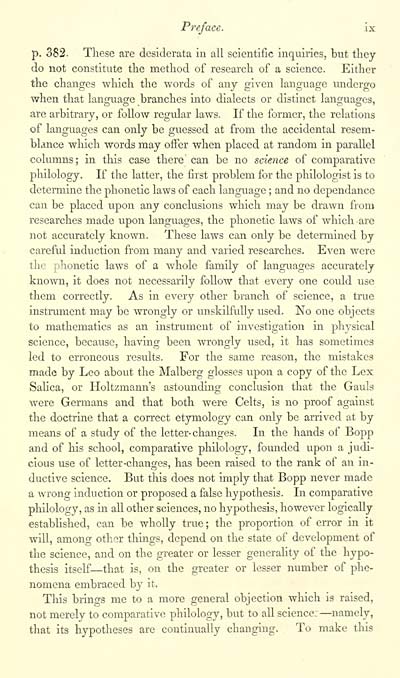Blair Collection > Celtic studies
(13)
Download files
Complete book:
Individual page:
Thumbnail gallery: Grid view | List view

Preface. ix
p. 382. These are desiderata in all scientific inquiries, but they
do not constitute the method of research of a science. Either
the changes which the words of any given language undergo
when that language branches into dialects or distinct languages,
are arbitrary, or follow regular laws. If the former, the relations
of languages can only be guessed at from the accidental resem-
blance wliich words may offer when placed at random in parallel
columns; in this case there' can be no science of comparative
philology. If the latter, the first problem for the philologist is to
detennine the phonetic laws of each language ; and no dependancc
can be placed upon any conclusions which may be drawn from
researches made upon languages, the phonetic laws of which are
not accurately known. These laws can only be determined by
careful induction from many and varied researches. Even were
the plionetic laws of a whole family of languages accurately
known, it does not necessarily follow that every one could use
them correctly. As in every other branch of science, a true
instrument may be wrongly or unskilfully used. No one objects
to mathematics as an instrument of investigation in physical
science, because, having been wrongly used, it has sometimes
led to erroneous results. For the same reason, the mistakes
made by Leo about the Malberg glosses upon a copy of the Lex
Salica, or Holtzmann's astounding conclusion that the Gauls
were Germans and that both were Celts, is no proof against
the doctrine that a correct etymology can only be arrived at by
means of a study of the letter- changes. In the hands of Bopp
and of his school, comparative philology, founded upon a judi-
cious use of letter -changes, has been raised to the rank of an in-
ductive science. But this does not imply that Bopp never made
a wrong induction or proposed a false hypothesis. In comparative
philology, as in all other sciences, no hypothesis, however logically
established, can be wholly true ; the proportion of error in it
will, among othor things, depend on the state of development of
the science, and on the greater or lesser generality of the hypo-
thesis itself — that is, on the greater or lesser number of phe-
nomena embraced by it.
Tliis brings me to a more general objection which is raised,
not merely to comparative philology, but to all science: — namely,
that its hypotheses are continually changing. To make this
p. 382. These are desiderata in all scientific inquiries, but they
do not constitute the method of research of a science. Either
the changes which the words of any given language undergo
when that language branches into dialects or distinct languages,
are arbitrary, or follow regular laws. If the former, the relations
of languages can only be guessed at from the accidental resem-
blance wliich words may offer when placed at random in parallel
columns; in this case there' can be no science of comparative
philology. If the latter, the first problem for the philologist is to
detennine the phonetic laws of each language ; and no dependancc
can be placed upon any conclusions which may be drawn from
researches made upon languages, the phonetic laws of which are
not accurately known. These laws can only be determined by
careful induction from many and varied researches. Even were
the plionetic laws of a whole family of languages accurately
known, it does not necessarily follow that every one could use
them correctly. As in every other branch of science, a true
instrument may be wrongly or unskilfully used. No one objects
to mathematics as an instrument of investigation in physical
science, because, having been wrongly used, it has sometimes
led to erroneous results. For the same reason, the mistakes
made by Leo about the Malberg glosses upon a copy of the Lex
Salica, or Holtzmann's astounding conclusion that the Gauls
were Germans and that both were Celts, is no proof against
the doctrine that a correct etymology can only be arrived at by
means of a study of the letter- changes. In the hands of Bopp
and of his school, comparative philology, founded upon a judi-
cious use of letter -changes, has been raised to the rank of an in-
ductive science. But this does not imply that Bopp never made
a wrong induction or proposed a false hypothesis. In comparative
philology, as in all other sciences, no hypothesis, however logically
established, can be wholly true ; the proportion of error in it
will, among othor things, depend on the state of development of
the science, and on the greater or lesser generality of the hypo-
thesis itself — that is, on the greater or lesser number of phe-
nomena embraced by it.
Tliis brings me to a more general objection which is raised,
not merely to comparative philology, but to all science: — namely,
that its hypotheses are continually changing. To make this
Set display mode to: Large image | Transcription
Images and transcriptions on this page, including medium image downloads, may be used under the Creative Commons Attribution 4.0 International Licence unless otherwise stated. ![]()
| Early Gaelic Book Collections > Blair Collection > Celtic studies > (13) |
|---|
| Permanent URL | https://digital.nls.uk/75771325 |
|---|
| Description | A selection of books from a collection of more than 500 titles, mostly on religious and literary topics. Also includes some material dealing with other Celtic languages and societies. Collection created towards the end of the 19th century by Lady Evelyn Stewart Murray. |
|---|
| Description | Selected items from five 'Special and Named Printed Collections'. Includes books in Gaelic and other Celtic languages, works about the Gaels, their languages, literature, culture and history. |
|---|

